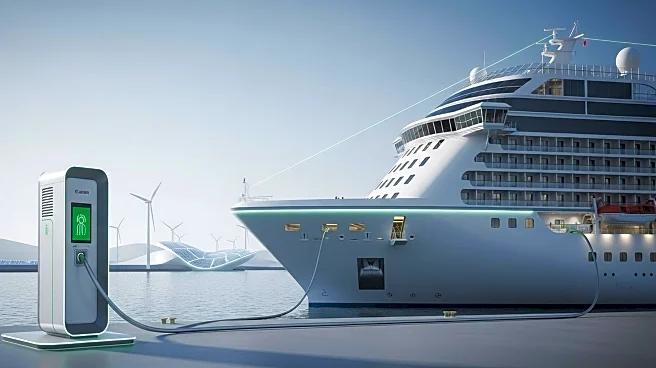What's Happening?
The cruise industry is making significant strides towards sustainability, as highlighted in the Cruise Lines International Association's (CLIA) 2025 Environmental Technologies and Practices Report. The report outlines the industry's commitment to achieving net zero emissions by 2050, with CLIA's 45 member companies investing heavily in technological innovations. These include advanced wastewater treatment systems, low-emission fuels, and shore-based power solutions. Onshore Power Supply (OPS) is a key focus, allowing ships to turn off their engines while docked, reducing emissions by up to 98%. Currently, 166 ships are equipped with OPS, and this number is expected to rise to 273 by 2036. However, only 41 ports globally offer OPS at cruise berths, with efforts underway to increase this number, particularly in Europe.
Why It's Important?
The cruise industry's move towards sustainability is crucial in reducing its environmental impact, particularly in terms of emissions and waste management. By adopting OPS and low-emission fuels, the industry is taking significant steps to lower its carbon footprint. This shift not only aligns with global environmental goals but also responds to increasing consumer demand for eco-friendly travel options. The industry's commitment to sustainability could set a precedent for other sectors within maritime shipping, encouraging broader adoption of green technologies. Additionally, the EU's Fit for 55 mandate, requiring major ports to offer OPS by 2030, is likely to accelerate these efforts, fostering a more sustainable maritime environment.
What's Next?
The cruise industry is expected to continue its investment in sustainable technologies, with plans to increase the number of ships equipped with OPS and alternative fuel engines. The first methanol-powered ships are anticipated to appear around 2026, marking a significant milestone in the industry's transition to cleaner energy sources. Furthermore, the expansion of OPS availability at ports, driven by EU mandates and funding, will be crucial in supporting these efforts. As the industry progresses towards its net zero emissions goal, stakeholders, including environmental groups and policymakers, will likely monitor and influence these developments.
Beyond the Headlines
The cruise industry's sustainability initiatives may have broader implications for maritime regulations and environmental policies. As the industry adopts advanced waste management systems and alternative fuels, it could influence regulatory standards, pushing for stricter environmental compliance across the maritime sector. Additionally, the focus on circular economy principles, such as waste-to-energy systems, highlights a shift towards more responsible resource management, which could inspire similar practices in other industries.









